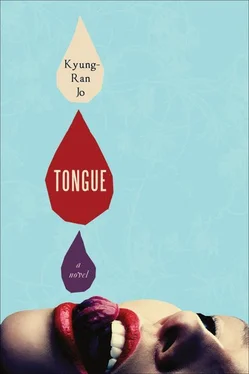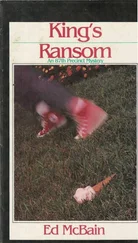Paulie is his dog. He trained him, saying, He reacts when I call his name, so maybe it’s possible to teach Paulie actual words. With Paulie, he disliked using orders like sit, stand, go back, go forward, go away, don’t bark, lie down, no, wait. Instead he wanted to teach words he could listen and react to, like Are you hungry? Do you want to go for a walk? Do you know that person? We discovered that, depending on the pitch, length, and frequency of Paulie’s noises, there was an imperfect but workable sphere of communication between us. But just as dogs saw the world in grays, dark browns, and greens, there was a limit to the language we could converse in. This is good enough, he’d said, pleased. Now he’s gone and left, giving me the dog he’d trained, the dog he’d raised for fifteen years, the dog he’d had even before he met me. Once the decision was made that we were to separate, we divided up our belongings as if we were playing jacks, but the problem of who would keep the dog was surprisingly easy. She didn’t like dogs.
We were rejected, you and me . I want to kneel on the ground and lightly nudge Paulie with my nose, ask him, You’re going to take care of me now, right? Something hot surges up from deep down within me. I swipe the back of my hand against my face, and then, because it feels as if I’m stuck in a tight corner, I touch my fingers, feet, and nose, carefully and seriously. The body parts that protrude, like noses and fingers, show the most wear and tear. Even though it isn’t perfect, my body is still held together in the right places and my fingers and toes still move freely. If I go limp now, if I give in to the heavy weight of sorrow, my body would quiver anew from the fresh sensation of pain—just like a sudden drip of candle wax on skin—and from the thrill of pleasure, all the more irresistible once I’d discovered it.
I’ve never even dreamed of what rejection would feel like, and I know that I need to sense pain and understand the reason behind it and force my way out of it. My eyes are sparkling, reflected in the living-room window, and my skin tightens and my muscles tense the same as when I make a sumptuous dish. Like a cork bobbing on water, I resurface lightly. And to push away the fear that is poised to grip me at any moment, I address Paulie in an unnecessarily loud voice: Paulie, want to go for a walk?
In the quest for gold a man may be lukewarm; but salt every one desires to find, and deservedly so, since to it every kind of meat owes its savor.
—Cassiodorus, A.D. 523
IT’S SO COLD on the last day of the Lunar New Year holiday that I buy a light-green down jacket on my way home from a walk. Every time I move, my body seems to rattle like bones encased in a tin. I go to work wearing that jacket. I run up the two flights to the restaurant, hurrying up the wooden steps whose edges are crusted with frozen snow. I took these stairs every day from the age of twenty to twenty-nine, when I quit to open the cooking school. Now, at thirty-three, I wish I could say that I’d briefly gone to a place nobody knows about before returning home. Just like the big and small scars on my arms, from flipping hot pans or splattering oil, ugly spots have invaded some part of my body under this heavy jacket. I grab the cold, frozen handle of the glass door with both hands. My palms stick to the surface. Now I’m one of seven cooks here. The door glides open after a screech of resistance, forbidding. I draw in a deep breath. Bread is already baking in the kitchen.
The other cooks talk about me when I’m not around, just enough for me to detect the hush when I get back to my station. In the bustling morning kitchen, as we marinate meat, bake bread and pastries, wash arugula, I try to think of myself as someone else in that kitchen, let’s say someone named K. K, a disciple of the head chef, graduated from Appennino, the culinary school specializing in Italian cuisine, and was immediately hired by Nove. For six years she was Chef’s trusted right hand and oversaw the kitchen with him. Within a year of becoming sous chef, she left to open a private cooking school, and some of Nove’s regulars took their business to Won’s Kitchen. The popularity of K’s cooking classes spread through word of mouth in the trendy Gangnam area, but by that time K had split up with the young architect she’d lived with for seven years. The woman he’d fallen in love with was O, the famous model. K, left behind with a dog, shuttered her cooking school and returned to Nove—K’s life can be summed up in only a few sentences. Now that I think of it, I would talk about K behind her back, too, and that makes me feel better. At least K doesn’t have the kind of life that nobody would care to talk about.
My rank is below that of Manager Park, who was the youngest cook when I quit, but I don’t have to wash and prepare vegetables or devein shrimp or debone chicken. Refusing to care what the others think of me, I bake, boil, steam, sauté, fry, season, stew in the small kitchen, next to the other cooks who don’t know everything about K’s life. A gossip in the kitchen would whisper that when K first got back here she was cowed by the senior cooks, but now she commands the kitchen a little too overtly, as if to show everyone that her burning desire is to work in this kitchen. K’s appearance here for the first time in four years is the kind of thing that nobody talks about but everyone takes note of. I don’t say a word, as if I know nothing about K. You talk about your knife slicing open your finger or shoes that pinch your feet, but you don’t talk about what’s in your heart. When I spread open the well-ironed white linens to change tables after a busy lunch service, I wonder, where did K’s life go wrong?
As I noticed when I first came back, the practice of closing the restaurant between three and five in the afternoon is still the same. During that time we prep for dinner service and one of the cooks makes a snack—a simple roll stuffed with avocado or flying-fish roe, or a tiny portion of noodles that could be finished with three swipes of chopsticks—and shares it with the others. Before, I usually made omelets with a sprinkle of sugar or fruit salad from leftover fruit, hand-squeezed orange juice, and honey. Snacks have to be either salty or sweet.
I’m leaning on the wall of the metal staircase that leads downstairs, at the end of the hall past the bathroom, when I hear someone’s footsteps approach. It doesn’t seem prudent to be caught standing around by myself yet, I think, as I dust off my hands and turn around to head back in. Chef is striding over from the far end of the hall like an angry man, with half of a thick baguette in his hand, and, without giving me the chance to refuse, shoves it quickly and forcefully into my mouth. “I don’t need a cook who doesn’t eat.”
I’m caught off guard.
“Did you forget that you have to be physically fit for this job?”
I’m quiet.
“Say you’ll eat it!”
I can’t answer because the baguette has taken over my mouth. In the kitchen, I watch what Chef is cooking, listen carefully for the words he sometimes utters, get a whiff with my nose, and, instead of asking questions, sneak a taste when he’s not there, just as I did back when I was an apprentice. So how did Chef figure out that I’m not eating anything? It’s only been three days since I started work.
After spending all that time in bed, I realized I was treating the act of eating as though it’s the art of Zen, taking in just enough, a little at a time, slowly. Exactly the way I never did with food. Like dancing without passion, eating like that will never awaken your palate. K may have lost another crucial thing: the obsession with good food, the strong impulse to make and eat it. Chef is right. There’s no need for a cook who doesn’t eat—you don’t only cook when you’re holding a knife in the kitchen.
Читать дальше












